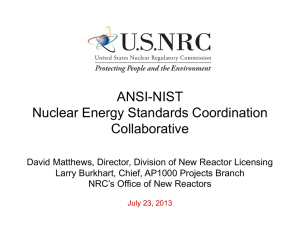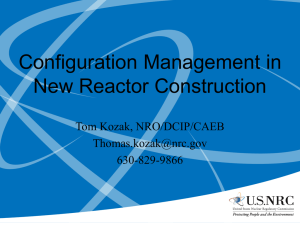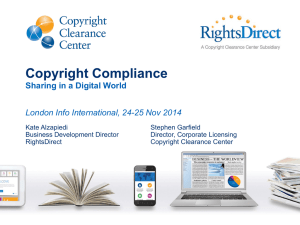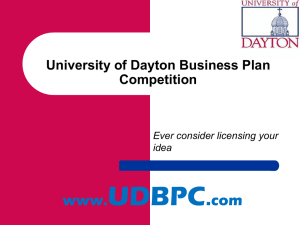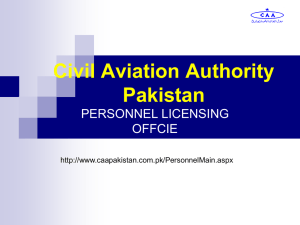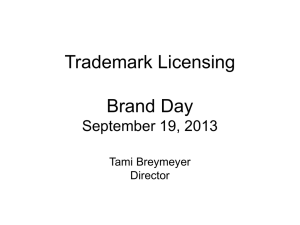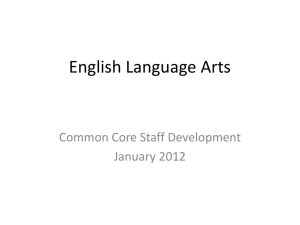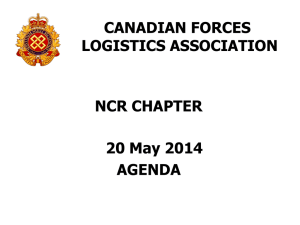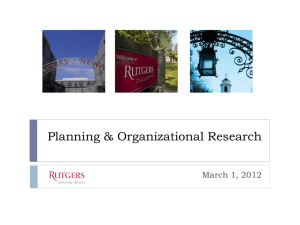NESCC 13-106
advertisement
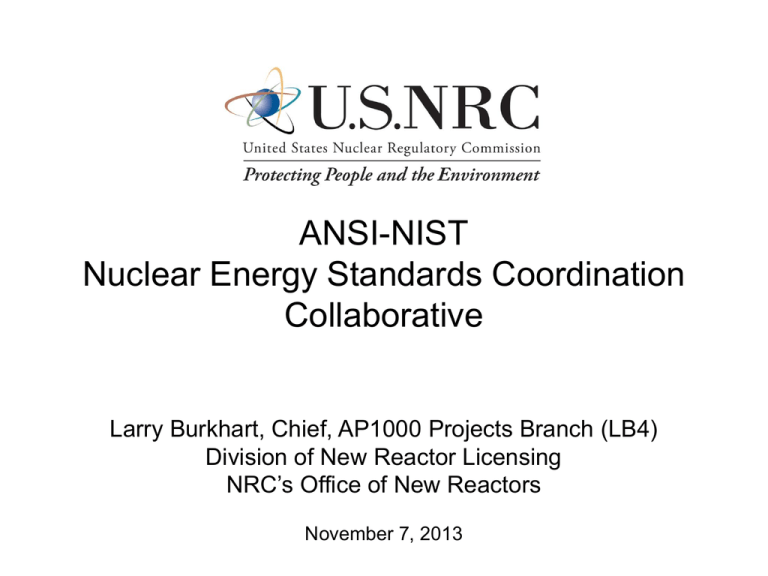
ANSI-NIST Nuclear Energy Standards Coordination Collaborative Larry Burkhart, Chief, AP1000 Projects Branch (LB4) Division of New Reactor Licensing NRC’s Office of New Reactors November 7, 2013 Agenda and Background Agenda • • • • New Reactor Designs/applications in the USA Quick construction status – Vogtle and Summer AP1000s 10 CFR Part 52 - combined licenses and certified designs Lessons learned from a regulatory perspective Background • • • • • • • • • • Combined license – NRC authorization to construct and operate a nuclear power plant in accordance with applicable laws, regulations, and conditions Latest version of Westinghouse’s AP1000 standard design certified in December 2011 SNC, et al, received combined licenses for Vogtle Units 3 and 4 on February 10, 2012 SCE&G, et al, received combined licenses for Summer Units 2 and 3 on March 30, 2012 First Nuclear Concrete (FNC) for Summer Unit 2 poured 9 – 11 March 2013 (4 November for Unit 3) FNC for Vogtle Unit 3 poured 12 – 14 March 2013 Continuing civil works, module fabrication and shipping, and large component deliveries 4 AP1000s under construction in China (Sanmen and Haiyang sites commenced in 2008) – cooperation with China bilaterally and multilaterally AP1000 design reviewed/under review in Canada, China, and the U.K. (MDEP) AP1000 being marketed in Czech Republic, India and other countries 2 New Reactor Applications Under Review – Large LWRs+ ABWR AP1000 ESBWR EPR USAPWR 3 +Large LWRs-- Large Light-Water Reactors, generally of the order of 1000 MW(e) or more Construction Status Vogtle Vogtle Unit 3 4 Construction Status Vogtle Vogtle Unit 3 5 Part 52 - Fitting the Pieces Together Pre-Construction Early Site Permit LWA Combined License Review, Hearing, and Decision Optional Pre-Application Review Construction Verification Verification of Regulations with ITAAC Reactor Operation Decision Standard Design Certification • Licensing decisions finalized before major construction begins • Inspections w/ITAAC (Inspections, Tests, Analyses, and Acceptance Criteria) to verify construction • Limited work may be authorized before COL issuance 6 Lessons Learned in COL Reviews First implementation of NRC’s 10 CFR Part 52 processes to issue COLs • • Bipartisan Policy Center Report (April 6, 2010) • Thorough and timely evaluation of license applications…however, there were expected problems in navigating the new processes • The Commission should ensure the lessons learned are rigorously applied to make the processing of subsequent applications more efficient NRC’s Lessons Learned Review Report – April 213 • High quality applications with sufficient detail • Timely development and maintenance of regulatory guidance • Strong design standardization • Early identification and timely resolution of complex issues • Improve system of requests for additional information • Concurrent reviews of design certifications and combined license applications • Update to regulations incorporating lessons learned 7 Terminology - Current Licensing Basis Definition of Licensing Basis (10 CFR 54.3) • Obligations (Regulations, License Conditions, Technical Specifications, Environmental Protection Plan, and ITAAC) • Mandated Licensing Basis Documents (FSAR, QA, EP, Security Plan, etc.) Vogtle/Summer-FSAR: • Summer — COL FSAR +Plant Specific DCD • Vogtle — ESP SSAR + COL FSAR + Plant Specific DCD 8 FSAR Plant –Specific DCD COL FSAR ESP SSAR (Vogtle Only) E Plans QA Tier 1 Tier 2 Tier 2* Security Op Programs E Plans Seismic Hydrology FFD 9 Design Certification – AP1000 and COLs That Reference the AP1000 Design is Certified, i.e., incorporated into NRC regulations as 10 CFR Part 52 Appendix D • Design is fixed at the detail of the Design Control Document • Standard and process for imposing and seeking changes is high • Rulemaking and the associated process is necessary to change • Issues covered by the design certification are resolved issues and are not subject to contentions during the COL hearing process • COL may depart from the certified design but must follow the change process identified in App. D • Tier 1 information • High level description of systems and drawings focused on safety aspects • Inspections, Tests, Analyses, and Acceptance Criteria (ITAAC) • For a COL to change – Exemption to Appendix D and amendment to COL needed • Tier 2 information • More detailed description of systems, structures, and components of the entire facility • COL licensee may depart from Tier 2 but must evaluate in accordance with the change process (50.59 process). An LAR may or may not be required • Tier 2* information • Subset of Tier 2 information that, if desired to be changed, must be requested in a License Amendment Request (LAR) in accordance with the change process. • Construction details (rebar design, etc.) 10 Experience post-COL Issuance First implementation of Part 52 processes (licensing basis maintenance) • License amendment (LARs), and exemptions, and ASME code relief requests • LARs are expected as design evolves and due to in-situ conditions • Design changes to rebar (shear reinforcement details) • Turbine building bracing • Additional electrical penetration assemblies in the containment • Inconsistencies between Tier 1 and Tier 2 • Other • Preliminary Amendment Request (PAR) Process • Codified in license as an option for the licensee (following ISG-25) • Flexibility in making physical changes while licensing basis change is udner review • Tied to an LAR • Obligation to construct in accordance with the licensing basis • NRO is performing a self assessment of the experience during the first year of licensing Part 52 plants (with input from licensees, vendors, public, staff) 11 NRC SELF ASSESSMENT REVIEW 1 YEAR POST-COL ISSUANCE Highlights of July 2013 Report ML13196A403 • Clarity of design control document (DCD) Tier 2* information could be enhanced • Better Communications between regulator and licensee can enhance better decision making • More effective interfaces on ITAAC Closure Notices • NEI 08-01 (endorsed by NRC regulatory guide 1.215) • Nexus of the construction Reactor Oversight Process (cROP) with the vendor oversight program • Monitor the current licensing basis change process to identify where additional process enhancements may be warranted • NEI 96-07, Appendix C (not yet endorsed by the NRC) • Preliminary Amendment Request (PAR) Process provides some flexibility • Codified in license as an option for the licensee (following ISG-25) • Flexibility in making physical changes while licensing basis change is under review • Tied to an LAR • Obligation to construct in accordance with the licensing basis 12 Summary •First implementation of Part 52 regulations to issue COLs and for post-licensing processes •Vogtle and Summer licenses issued and construction ongoing •Experience gained in licensing pre and post COL issuance •A learning experience for regulator and licensee •Improvements can be made •Assessments to inform improvements •Philosophy of Part 52 – Standardization •Importance of maintaining current licensing basis •Managing changes appropriately •Proper change processes •Safety benefits •ITAAC completion •Safe operation OFFICIAL USE ONLY 13 10 CFR Part 52 QUESTIONS? www.nrc.gov/new-reactors/col-holder/html 14 ACRONYMS •CLB – current licensing basis •COL – combined license •DCD – design control document •EP – emergency plan •ESP – early site permit •FFD – fitness for duty •ITAAC – inspections, tests, analyses, and acceptance criteria •LAR – license amendment request •LWA – limited work authorization •LWR – light water reactors •SMR – small modular reactor •SSAR – site safety analysis report •UFSAR – updated final safety analysis report OFFICIAL USE ONLY 15
